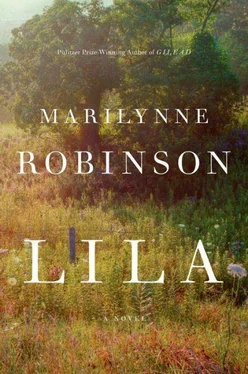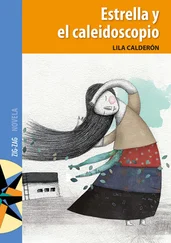She stepped back and looked at him. “I don’t see what it would matter.”
He shrugged. “We don’t have to worry about that now. It looks like we’re going to have a decent rain, after all. You could just sit here a while and help me enjoy it. Should I call you Lila?”
“No reason why not.”
He brought a sweater and put it over her shoulders. Right away she knew she was going to steal it. It was gray like his jacket and it had the same old wool smell, old wool and a little shaving lotion. She’d find a way to slip it into her bag. She could hardly wait till she got the chance. He’d know what she’d done. That don’t matter.
So they sat there and watched the rain, he at one end of the porch swing, she at the other. After a while he said, “I’d like to know what you’ve been thinking about lately, since the last time we talked. You asked me why things happen the way they do, and I had to say I didn’t know. I still don’t. But the question is interesting.”
“Oh,” she said, “you don’t want to know what I been thinking.”
He nodded. “All right.”
“I been wondering why I even bother. There must be a reason, but I don’t know what it is.” When she sat in the doorway at night with her knees drawn up and her arms around them so there was warmth against her belly and her breasts, she sometimes liked it all well enough, the stars and the crickets and the loneliness. She thought she could unravel the sounds the river made, the flow over the rocks where there was a little drop into a pool, the soft rush of the eddy. Now and then there were noises, some small thing happened and disappeared, no one would ever know what it was. She thought, All right, if that’s how it’s going to be. If there had not been that time when she mattered to somebody, she could have been at peace with it. Doane was just the world being the world. It was Doll taking her up in her arms that way. Live. Yes. What then?
He said, “I’m glad you do. Bother.”
And then she heard herself say, “You come creeping around my house at night? Because I think I heard you out there.” And she looked at his face. It was startled and hurt. Shamed. She couldn’t look away.
He rubbed his eyes. “Yes. Well, I’m sorry if I worried you. I don’t sleep well, and sometimes I walk around the streets at night, past the houses of people I know. It’s an old habit of mine.” He laughed. “I pray for them. So it’s harmless at worst.”
“You come all the way out there to pray for me? Couldn’t you do that at home?”
“I did wonder if you had left town. If you were all right.”
“I guess everybody knows I been living in that shack. If you knew where to come to do your praying.”
He shrugged. “Some people know. People notice things.”
“I hate this town.”
“I doubt it’s so different from other places.”
She laughed. “I hate other places. Worse, probly.”
And he laughed. “Well, just so you understand what I was doing out there. So you don’t feel uneasy about it.”
“I never said I understood. You tell me you was praying. I don’t understand that at all.”
“Ah!” He shook his head. “It would take me a good while to figure out what to say about that. Days! And I pray all the time.” Then he said, “Here is what I don’t understand. How did you know it was me? It was a dark night, and I didn’t come near the house.”
She shrugged. “Who else would go to the trouble?”
He nodded. “Thank you. I don’t know why. But that’s kind of you to say, I believe.” Then he said, “You do have other friends here.”
“No, I don’t. Folks just do what you tell them to do.”
He laughed. “Some of them. Sometimes. I suppose.”
For a while the rain was heavy, loud on the roof, spattering onto the porch. She gathered the sleeves of the sweater against her.
“Are you warm enough?”
“Plenty warm. But I want to know what you said in that prayer.”
“Well.” He blushed. “I prayed that you were safe and well. And — not unhappy.”
“That’s all?”
“And”—he laughed—“I did mention that I hoped you would stay around for a while.”
“And get myself baptized.”
“I guess I forgot to mention that. Sorry.”
“It’s nothing to me. I’ll be making up my own mind.”
“Of course.”
“But if you prayed for it, most likely I would make up my mind to do it.”
“Maybe. Depending. I don’t know.”
“If you want me to do something, seems it would be easier just to ask me. ”
“If I did ask you, would you do it?”
She shrugged. “Maybe. I don’t know.” And he laughed. Then she said, “That all you prayed for?”
“No. No, it isn’t.” He stood up. “I think I’ll make some coffee.”
Well, she’d stayed too long and the rain didn’t show any sign of ending. So she said, “I’ll be going now,” after he’d gone into the house, so he might not have heard. And she slipped the sweater into her bag. She was a block away when he caught up with her. He was carrying an umbrella.
He said, “I’m afraid it’s too late for this to do you much good. But please take it.”
She said, “Don’t need it.”
“Of course you don’t,” he said. “Take it anyway.” So she did. He said, “I’m glad you came by. I’m always happy to find you creeping around my house.” And she almost had to laugh at that. She could put the umbrella over her suitcase and her bedroll. That’s how bad the roof leaked. She just might forget to return it for a while. She was going to use that sweater for a pillow. She thought, What would I pray for, if I thought there was any point in it? Well, I guess the first thing would have to be that there was some kind of point in it. The wind was blowing the rain against her and lifting the umbrella almost out of her hands, so she closed it. A little rain never killed anybody.
She thought of a story she would like to tell the old man. Once, when she was still a child, she and the others went to a camp meeting. Doane had been paid mostly in apples for some work they had done. The farmer said it was the best he could do — you can’t get blood from a turnip. Doane said it might be interesting to try, and Arthur nodded. But the man just shrugged — hard times — and Doane took the apples, after he had spilled them out on the grass and had the children look them over, so the farmer could take back any that were soft or bruised or too wormy and give them others that were sound. They had to carry the apples in two gunnysacks, since that was after they lost the wagon. They ate apples for breakfast and apples for supper, and still the sacks were a burden to carry, with everything else. So when they found out from people walking along the road that they were going to a camp meeting, Doane decided they would go there to sell what apples they could. The whole business made him disgusted, but he had the children to do the work for him, to talk a few cents out of the old women before they felt the spirit and put anything they had into some damn preacher’s pocket. He made them all clean up as well as they could and told them to behave, and then he just leaned against a tree with his arms folded while they chose the prettiest apples and shined them up a little against their pant legs, and took off into the thick of the crowds.
They’d have hung back with Doane and watched those poor fools getting all worked up over nothing if they hadn’t had the apples to sell, which obliged them to talk to people and try to act as though they belonged there. Lila followed along after Mellie, who could somehow make those apples seem like something you would want. Lila carried them, her arms full, because Mellie had already come up with a baby somewhere, a nice baby with a big red bow in its hair. Mellie and the baby handed the apples around as if they were doing a kindness, and people gave Mellie their pennies and nickels, and then she sent Lila back to give the money to Marcelle — Doane was acting like he had nothing to do with any of it — and to get more apples.
Читать дальше












